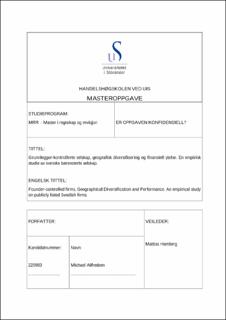| dc.description.abstract | This study investigates the relationship between founding-family governance, international activities and corporate performance in the Swedish institutional setting. Previous research has mainly studied founder-controlled firms, i.e. firms where founders or their descendants hold top management positions, in the context of corporate performance and ownership composition. In particular, this paper anchors in the theoretical bodies of finance and international business and hypothesizes a negative effect of founding family governance on internationalization decisions. Nevertheless, these firms are anticipated to outperform other entities when they engage in international activities. Unlike other studies, this paper investigates whether the founder’s control of voting rights impacts the decision to geographically diversify. Furthermore, this paper examines whether there is a distinction in financial performance of founding family firms where the founders employ top management positions (CEO or Chairman of the board) versus serving as board members only. The initial sample consists of 5,228 firm-year observations from listed entities on the Nasdaq OMX Stockholm Exchange between 2001 and 2019. Following prior research, the sample is further narrowed to 3,048 unique firm-year observations which forms the basis for the empirical analyses. The results from the statistical regressions find abutment in all the proposed research hypotheses. Specifically, this paper finds strong support that founder-controlled firms indeed are present in fewer geographical locations and as such are less internationalized compared to firms having dissimilar governance structures. These results are further enhanced when increasing the founders share of voting rights. Nevertheless, although founder-controlled firms seem to follow the incremental internationalization process as described by the Uppsala Model, they seem to outperform other entities when they undertake internationalization decisions. The overall findings further imply that firms where the original founder persists substantial control create superior value, have efficient strategies and are more profitable which in turn indicates that such entities might be a favorable investment opportunity for outside stakeholders. | |
